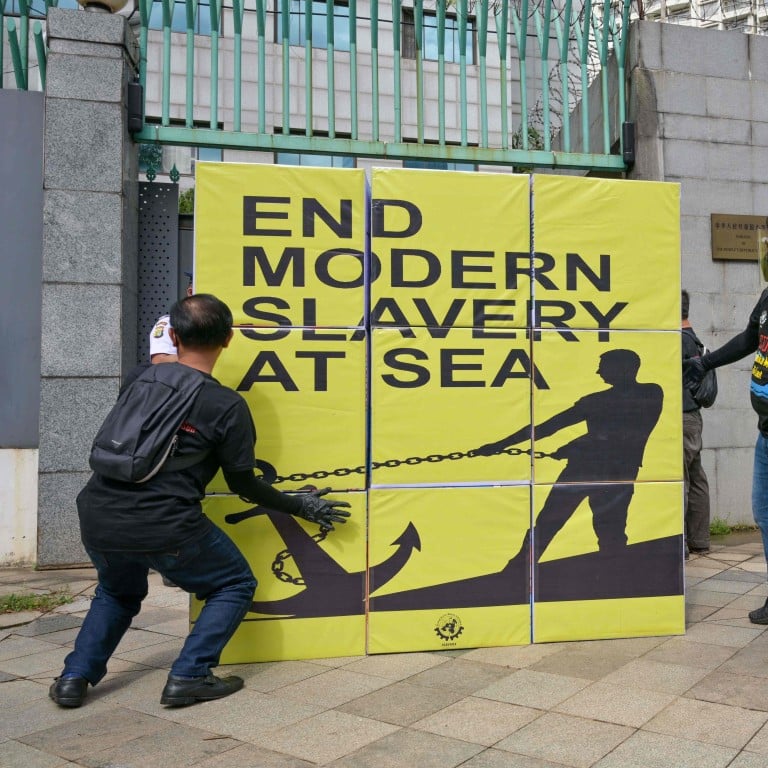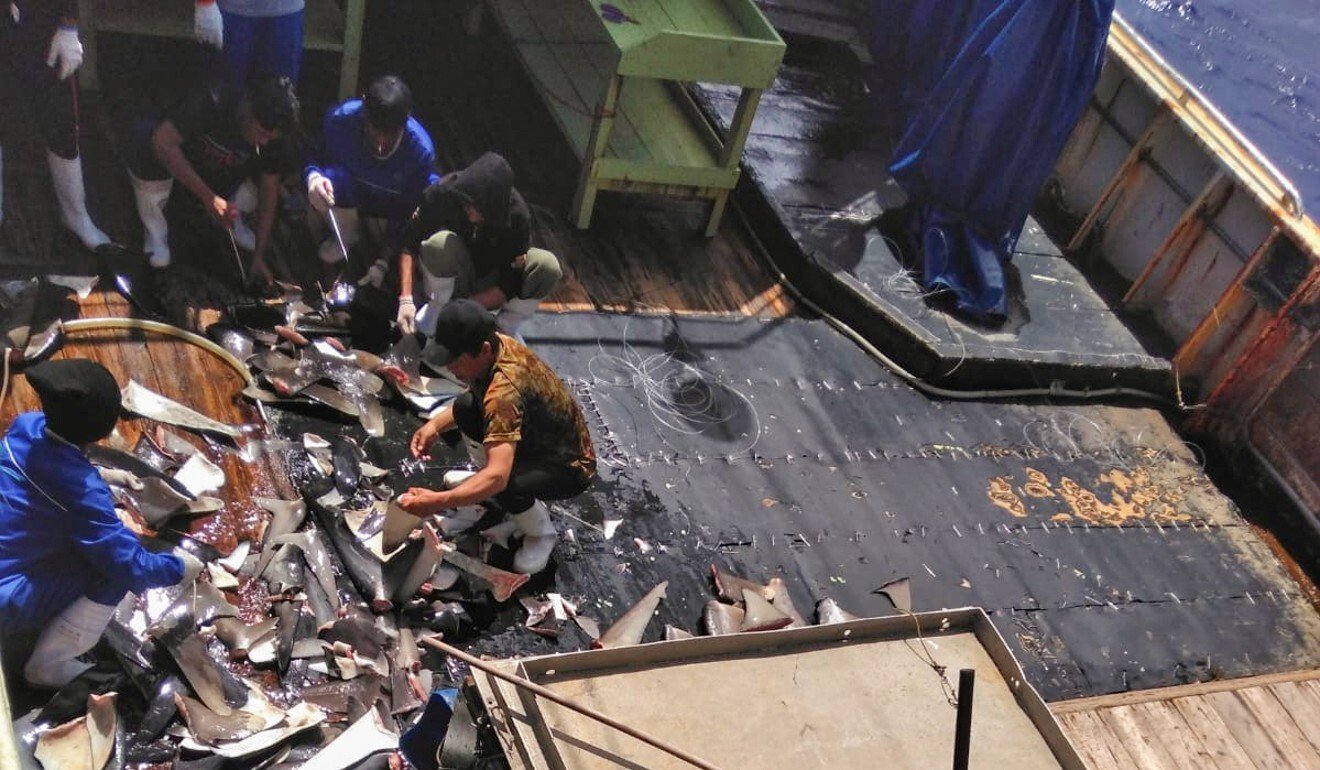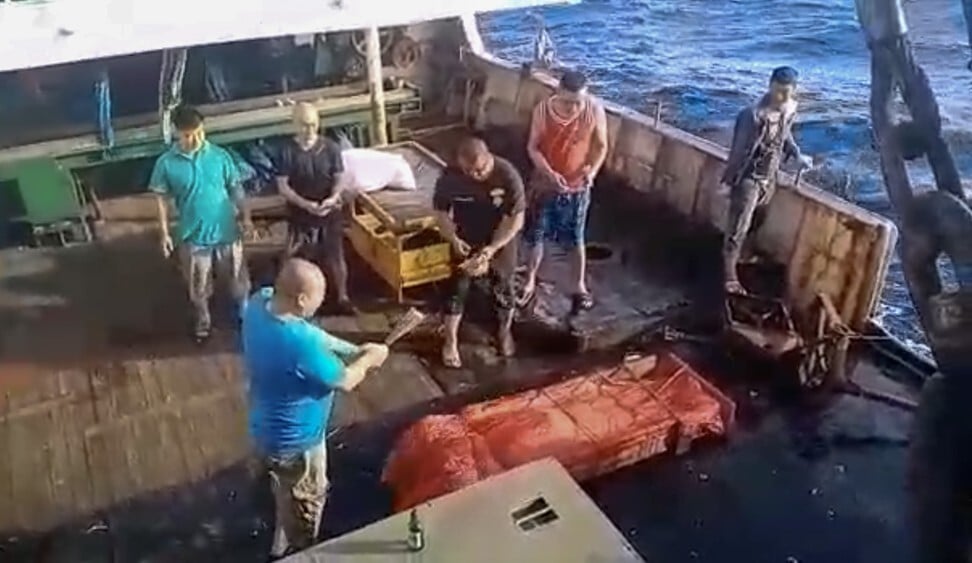
Indonesian workers still face abuse at sea, despite efforts to end modern slavery: report
- Greenpeace says 26 firms from mainland China, Hong Kong, Taiwan, the Ivory Coast and Nauru were cited in scores of forced labour complaints from 2019 to 2020
- The growing problem comes even after Indonesia sought China’s help in protecting its workers, and the UN General Assembly adopted a resolution to protect seafarers during the Covid-19 pandemic
Chinese and Hong Kong fishing companies are among a growing number of firms involved in forced labour practices towards Indonesian migrant workers, a new report by environmental group Greenpeace reveals, underlining the challenges in eradicating modern slavery practices at sea despite continuous diplomatic efforts.
The report released on Monday found that 26 firms from mainland China, Hong Kong, Taiwan, the Ivory Coast and Nauru were cited in scores of complaints of forced labour at sea from 2019 to 2020.
Illegal fishing, abuses of Indonesian workers on Taiwanese ships: report
The Indonesian Migrant Workers Union (SBMI), whom Greenpeace collaborated with, said it received 338 complaints between September 2014 to July 2020. Of those, 104 complaints were submitted last year alone, up from 86 complaints in 2019.
Greenpeace analysed reports submitted from May 2019 to June 2020, and identified forced labour in 62 cases, almost double the 34 cases recorded in its report released two years ago. The group also identified 45 vessels of interest, far higher than 2019’s figure of 13.
In most of the 45 suspected ships, common indicators of forced labour included the withholding of wages, abusive working and living conditions, deception, and abuse of vulnerability, according to Greenpeace.
“Alleged cases of forced labour to migrant fishers have been well documented over the years with no signs of improving. In fact we’re seeing cases and complaints increase,” Ephraim Batungbacal, regional oceans research coordinator for Greenpeace Southeast Asia, said in a statement.
A Foreign Ministry spokesman did not immediately respond to requests for comments on the group’s findings.
According to the fishermen’s testimony to the lawyers and advocates, the three men were subjected to gruelling conditions before they died, including working up to 21 hours a day, and suffering verbal and physical abuse by the Chinese crew.
Indonesian fishermen were also forced to eat unhygienically prepared meals and drink seawater, as opposed to the Chinese crew members who were given bottled water.
Indonesia slams ‘inhuman’ treatment of fishermen on Chinese boats
In Greenpeace’s latest report, a 21-year-old Indonesian worker on a tuna-catching vessel was quoted saying that anyone who tried to escape would be beaten and deprived of food.
Andrisen Ulipi, a former crew member on Hanrong 363, a Chinese-flagged trawler, described how his fellow Indonesian crew members had worked long hours, but were given water “once every two days, like a chicken”.
All transactions, even for fuel, took place in the middle of the sea, underlining the long periods of time at sea many migrant workers face.
In the aftermath of the Long Xing incident, four Indonesian crew members recently received a total of 176.5 million rupiah (US$12,360) in restitution.
A court in Brebes, Central Java, in February sentenced a recruiter to three years and four months in prison.
Interviews reveal ‘inhuman’ conditions Indonesians faced on Chinese fishing boats
Indonesia has also sought diplomatic efforts to seek justice and increase the protection of Indonesian fishing workers.
Last August, Foreign Minister Retno Marsudi expressed concern to her Chinese counterpart Wang Yi about the mistreatment of Indonesian workers on board Chinese-flagged fishing vessels and asked for China’s cooperation in providing mutual legal assistance, to which Wang responded positively, Indonesia’s foreign ministry said.
In 2020, the ministry received 1,451 reports involving the mistreatment of Indonesian crew aboard fishing vessels, up from 1,095 reports in 2019 and 1,079 reports in 2018. Most of the cases related to unpaid or withheld wages.
Activists say the Indonesian government still needs to set and implement regulations to support a 2017 law designed to protect Indonesian migrant workers and prevent them from being subject to human trafficking and modern slavery.
“The 2017 law on Indonesian migrant workers protection is a good start, but it’s been four years now and the implementing regulation is yet to be introduced,” says Fadilla Octaviani, co-founder and director for enforcement support and access to justice at Jakarta-based Indonesia Ocean Justice Initiative.

Hariyanto Suwarno, chairman at the Indonesian Migrant Workers Union said many cases of human trafficking and modern slavery go unreported in part due to the long legal process.
“The lengthy legal process spooks many crew as it is convoluted and it doesn’t fulfil a sense of justice to many victims. The prosecution is also not enough of a deterrent for the perpetrator,” he said.
Indonesian police officers are often deemed by fishermen as providing “lip service” to investigating suspected cases, Hariyanto added, with many tending to go after perpetrators only when a case “is booming and exposed by international media”.
Indonesia charges three recruiters over sailor’s death on Chinese vessel
Fadilla from the Indonesia Ocean Justice Initiative said the Covid-19 pandemic has exacerbated the situation as companies’ operations were disrupted and their incomes declined.
“Companies must suppress [operational] costs while at the same time also repatriate their workers, which costs a lot,” she said. “Indonesian crew are scattered in small, Pacific states, whose borders remain closed, so that poses a challenge in bringing them home.”
As of last month, Indonesia has repatriated more than 57,000 stranded migrant workers since April 2020.
Meanwhile, the UN General Assembly in December unanimously adopted a resolution, initiated by Indonesia, on international cooperation to protect seafarers during the pandemic by designating seafarers and other marine personnel as key workers.
The resolution, sponsored by 71 UN member states, proposed countries to immediately implement measures to facilitate safe ship crew changes, repatriate stranded seafarers, and to ensure access to medical care for all seafarers and other marine personnel.
However, many fishermen today remain stranded overseas.
Angel Marta Gultom from SBMI Taiwan said that there were currently about 100 Indonesian fishermen who have overstayed their visa after their work contracts expired, but are unable to return home due to border closures.
“We have continuously relayed their complaints to Indonesian embassy in Taiwan, but we were told that we still have to wait because Taiwan still has lockdown measures in place,” she said.


